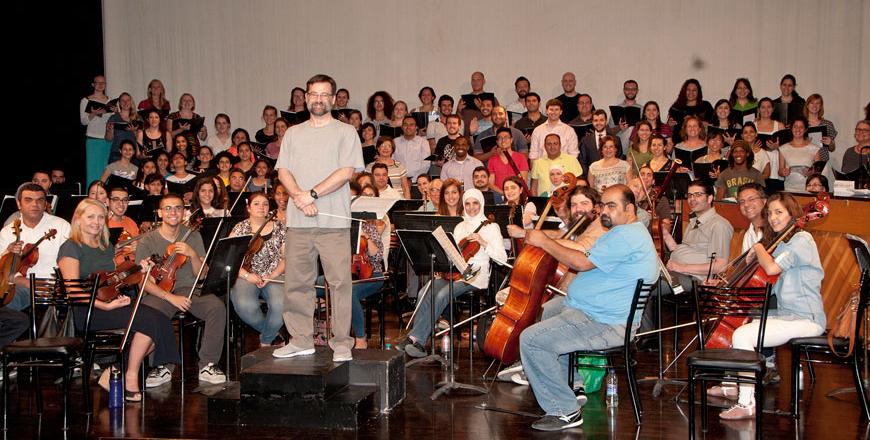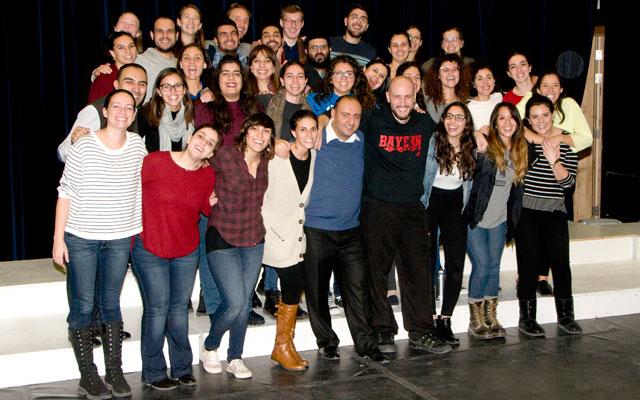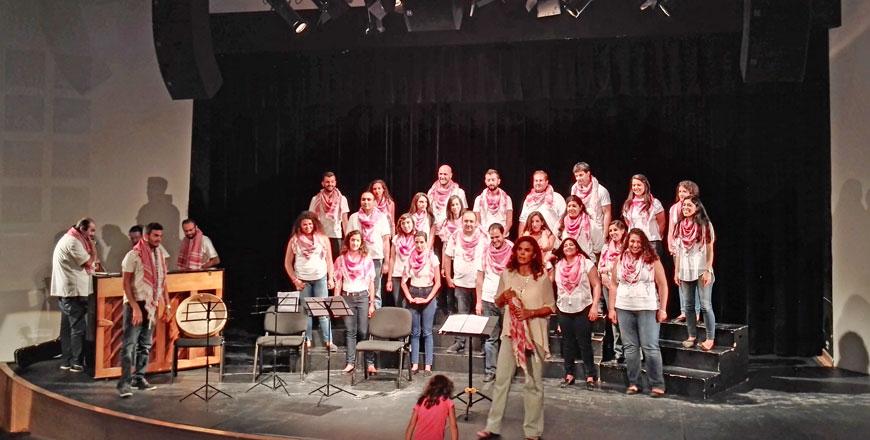You are here
Jordan to enjoy Carmina Burana live
By Jean-Claude Elias - Jun 09,2015 - Last updated at Jun 10,2015

Conductor William Culverhouse with the musicians of JOrchesrtra and Dozan Wa Awtar singers rehearse on Monday evening at the International Academy in Amman (Photo by Jean-Claude Elias)
Even by European or American standards this is considered a big classical musical event. One hundred and thirty artists, 65 singers and 65 musicians will be together on stage to perform Carl Orff’s major work, Carmina Burana. Three performances are to take place at the auditorium of the International Academy — Amman on June 11, 12 and 14.
Visiting American conductor William Culverhouse has been in the country for about a month and has been working with the singers and the musicians since he arrived. Culverhouse has already been in the country to conduct orchestras several times, the last one being in 2014 for the interpretation of Haendel’s The Messiah. Speaking to The Jordan Times at a rehearsal held on Monday 8 with all the artists, he expressed his satisfaction with the way the rehearsals have been going saying “despite the challenging composition I am very happy with the result we are getting. Carmina Burana is a musical work with frequently rapidly changing metres and this requires good performing skills”.
The combination of the musicians of the JOrchestra ensemble (The Jordanian National Orchestra Association) and the singers of the Dozan Wa Awtar celebrated Jordanian choir is producing an impressive sound. This is especially important when it comes to Carmina Burana, a modern classical work from the 20th century that strongly relies on massive vocals and energetic rhythms. Janelle Brown, the choir conductor said they have been rehearsing for this series of three concerts since February. She told The Jordan Times that Dozan Wa Awtar is exceptional in that its members “strike a nice balance between Jordanians and expatriates living in the country, between men and women and between the young and the less young”. Soloists Dima Bawab, Charles Stanton and Clay Hilley will also participate in the singing with the choir.
Katherine Sullivan-McNamara, one of the singers, commented that “Carmina Burana is not easy to like from the first time, but the more you sing it, the more you listen to it and the more it grows on you”. Dina Raad, another singer added “I enjoy the challenge and I think the result is actually quite good.”
Culverhouse also said that there will be a little oriental touch added with a musician playing the qanun and verses of Arabic mediaeval poetry recited at one point. He added that “this should go well with the poems that Carmina Burana was built on and that also date back to the same period in history”.
Nady Muna, one of the organisers, manages Dozan Wa Awtar and also sings with the choir. He was very enthusiastic about the exceptional project, and explained to The Jordan Times how the idea emerged a few months ago, stressing the invaluable input of Dozan Wa Awtar’s founder Shireen Abu Khader who is currently in Canada.
German composer Carl Orff wrote the music in 1936 for a set of 24 secular songs from the Middle Ages. Whereas the wide public may not be familiar with the entire work that is about one hour long, the opening and ending music (O Fortuna) is very well known and is often heard and has become very popular. Carmina Burana, sometimes referred to as a “Scenic cantata”, is beyond any doubt one of the most significant, most performed classical works from the 20th century, alongside Rodrigo’s Concerto de Aranjuez.
Related Articles
AMMAN — Dozan Wa Awtar Singers, Jordan’s most famous choir, is once again in the limelight, this time with a significant difference. “
AMMAN — It is not every day that a Jordanian choir reaps two gold medals at an international competition in which more than 12,000 singers f
AMMAN — Jordan’s Dozan wa Awtar choir has won two gold medals at the 9th World Choir Games in Sochi, Russia, choir manager Nedy Muna announc














